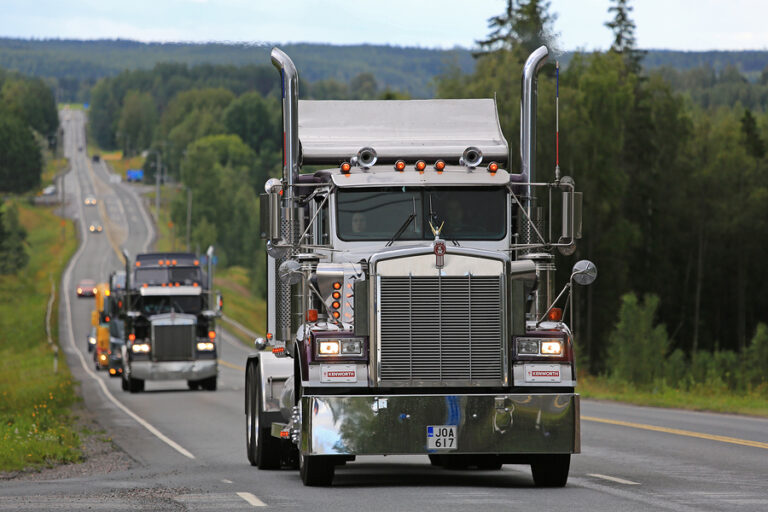How to choose a MN Truck Accident Lawyer
Jeff
on
May 23, 2025

Key Takeaways
- Minnesota truck accidents involve their distinct challenges. Severe weather, unique roadway features, and state-specific trucking laws add layers of complexity that go beyond the average vehicle accident.
- Navigating a truck accident claim often requires an attorney, like Premier Injury Attorneys, with deep knowledge of Minnesota and federal trucking laws to address all liable parties and maximize compensation.
- Document the best evidence possible to establish fault! Assemble all available and relevant black box data and driver logs to construct the strongest case.
- Minnesota’s no-fault insurance laws may restrict your recovery of damages. Exceptions sometimes allow you to file other claims if you experience catastrophic injuries.
- Acting quickly following an accident, getting medical treatment, gathering evidence at the scene, and hiring an experienced attorney ensures your rights are protected.
- Hiring an experienced local Minnesota law firm with a track record of winning truck accident lawsuits increases your chances of winning the compensation you deserve. It increases your chances of success in a court of law.
We understand that there are many options for choosing a truck accident lawyer serving Nanuet, NY, but our record speaks for itself. In addition to their experience and skill, our attorneys have an in-depth understanding of state and local road laws and insurance company practices in Rockland County.
No doubt handling truck accident cases takes a particular skill and local know-how, as rules that govern trucks often vary entirely from those that govern cars. A skilled attorney will know how to get you immediate medical treatment.
They obtain evidence quickly and negotiate with insurance adjusters to get you the compensation you deserve.
Why MN Truck Accidents Are Different
Minnesota experiences truck accidents with unique elements not present in all other states. The weather, road types, and local laws all play a part, making these cases more complex than typical car crashes. These factors lead to truck accidents here, causing more severe injuries. Legal claims, whether negligence or vicarious liability, can be complicated by numerous defendants and deadlines. Below, the key differences in Minnesota are laid out.
Unique Dangers on Minnesota Roads
Minnesota roads are perhaps better associated with their bitterly cold winters. When snow and ice cover the streets, stopping a fully loaded semi becomes more difficult. Even the best drivers can lose control on black ice.
Many of these crashes occur on rural roadways, where the potential for visibility reduction and narrow, soft shoulders increases. Townships and rural areas, especially along highways like I-94, I-35, and U.S. Route 53, see more truck crashes than busy city streets.
These highways create a deadly mix of local city traffic and high-speed, long-haul trucking, significantly increasing the potential for accidents. Minnesota’s rural roads tend to have little lighting and dangerous curves, making it challenging for truckers to react accordingly within an appropriate time frame.
Less than 13% of the people injured in these crashes are inside trucks. Those in smaller vehicles feel the majority of the negative impact.
Complex State and Federal Rules
Federal law dictates how many hours truck drivers can spend on the road. While Minnesota enforces these rules, many drivers are pressured by employers to forgo breaks. State law adds additional layers regarding who can file a lawsuit, with requirements such as the need for a trustee for wrongful death claims.
Both federal and state regulatory agencies are highly focused on safety. You need to look at company logs, driver histories, and maintenance records in every case. Liability usually hinges on compliance with each set of rules.
Minnesota’s No-Fault Insurance Twist
Minnesota’s no-fault insurance system requires injured individuals to file a claim with their insurer first. This pays for medical expenses and lost income, up to a certain threshold, no matter who is at fault for the accident.
If injuries are catastrophic or if an accident results in death, victims have the right to pursue claims against the liable driver. Under Minnesota law, that action can be taken as long as six years after the incident.
This period is much more extended than most of MN’s bordering states! These laws dictate how attorneys pursue these truck accident cases.
The Specialized MN Lawyer Advantage
Minnesota truck accident claims have special statutes, rigorous timelines, and challenges. A Minnesota truck accident lawyer with deep roots in Minnesota’s legal community provides value far beyond what you’ll find in any law book. They draw upon years of experience working with local courts, state statutes, and practical local strategies.
Most Minnesota clients tend to rely heavily on referrals from friends and family. This trust is based on tangible outcomes and hands-on testimonials.
1. Deep Minnesota Truck Law Knowledge
An experienced Minnesota truck accident attorney understands Minnesota state rules and federal trucking regulations. That combination is key. Every case can turn on minute particulars hidden in Minnesota state laws or new case laws.
For instance, some weight limits and safety inspections are stricter than federal standards in Minnesota. A lawyer well-versed in these regulations can quickly identify errors in a trucking company’s logs.
Further, they can identify evidence that other attorneys have overlooked. This thoroughness allows us to create the strongest possible cases that win in court.
2. Mastering Evidence: Black Boxes to Logs
The key to winning a truck accident case is usually the evidence. Local attorneys understand how to obtain black box evidence, analyze driver logs, and investigate maintenance records.
They collaborate with expert witnesses who can simplify technical data. This complete method reveals the facts and demonstrates liability, even when major trucking businesses try to withstand it.
3. Identifying All Liable Parties
It can be the drivers, trucking firms, parts makers, or even the maintenance shops working on the vehicle. Minnesota lawyers consider all angles.
Occasionally, a third party, such as a tire store, is partly to blame. By identifying all at-fault parties, attorneys can fight for maximum compensation.
4. Skilled Insurance Negotiation Tactics
Your insurance companies have used tactics to chip away at payouts. Minnesota lawyers fight back with clear documentation, aggressive negotiation tactics, and a willingness to bring the battle into a courtroom.
This ensures clients’ interests are always at the forefront.
5. Proven Results in MN Courts
We’ve recovered over $1 billion in personal injury and truck accident cases for Minnesota clients. Testimonials from former clients and results from litigation victories provide evidence of a long-standing commitment to aggressively battling on behalf of Minnesotans’ rights.
Common Minnesota Truck Crash Scenarios
Minnesota truck crashes reveal predictable patterns related to our unique road and weather conditions and the larger trucking landscape. Covering the full gamut of scenarios, including rear-end crashes and full truck rollovers, this shows just how multifaceted the truck crash problem is.
Each scenario indicates the dangers truck drivers pose to everyday drivers and vice versa.
Frequent Causes on Our Highways
Additionally, speeding, careless lane changes, and defective equipment are common factors in Minnesota truck-involved crashes. Driving distracted, such as texting while driving or using other devices, further increases the risk, especially when driving heavy trucks.
Truck driver fatigue is an imminent hazard. Many drivers push through long hours, sometimes using stimulants, which leads to slow reflexes and mistakes.
In one recent year, Minnesota experienced more than 4,300 truck crashes—over 1,300 resulted in injuries and 60 were fatal. When conditions are as bad as snow and ice, both operator skill and equipment are put to the extreme test.
Many rural roads are poorly designed, with unexpected sharp curves, steep grades, or unusual traffic patterns that surprise even experienced truckers. According to FMCSA data, more than one in five of these crashes are caused by drivers unfamiliar with the route.
We have found that experience makes a huge difference. Many of these crashes could have been prevented by training and adherence to regulations.
Types of Devastating Truck Collisions
This is why head-on, side-impact, and multi-vehicle crashes involving big rigs are the most damaging. With a fully loaded semi weighing as much as 80,000 pounds, the results of a collision with a smaller car are rarely a fender bender.
Common injuries are brain injury, spinal cord injury, and amputation. Legal ramifications depend on the type of crash and who’s to blame.
For example, it might have been caused by a trucker passing up rest breaks or a highway in disrepair.
Weather’s Role in MN Truck Wrecks
Minnesota’s winters are notoriously harsh, with slick roads and limited visibility. Trucks require more stopping distance—an average of 525 feet compared to the 316 feet that cars must have.
Tires and brakes need to be in excellent condition. Heavy snow, fog, or rain can obscure hazards till it’s too late to react.
This means that drivers should slow down, check forecasts, and adjust for whatever weather conditions they encounter.
Your MN Truck Accident Claim Journey
Minnesota’s unique truck accident claim handling process consists of specific steps and strict requirements. Local rules, bustling interstates such as I-94, and the grave dangers of mammoth commercial trucks all impact what a claimant should anticipate. Understanding what you should be doing at every step is the key to safeguarding your rights and ensuring a favorable outcome.
First Steps After a Crash
Seek medical attention immediately, even if injuries are minor. Keep detailed records of all medical visits and expenses. With your phone, take wide-angle and close-up photos of the crash scene, every vehicle involved, and any visible injuries.
Jot down names and phone numbers of witnesses, particularly those who witnessed the crash at locations such as Hiawatha Avenue. Contact the police and request a report. This report is essential for your claim in Minnesota. Report the collision to your insurance company, but make it brief and basic, providing only factual information.
Essential documents for your claim:
- Police accident report
- Photos from the scene
- Medical records and bills
- Insurance policy details
- Witness names and contacts
- Estimates for car repairs
Building a Strong Minnesota Case
Retain all documentation, such as invoices for vehicle repair and medical treatment. Collaborate closely with your attorney to develop a chronological order of events, leveraging interviews conducted with others and witness testimony.
In Minnesota, it’s vital to gather evidence quickly, as weather and traffic can obscure important details. Your attorney can employ specialists to determine whether brake failure or driver negligence caused the accident.
How Liability is Proven Here
Minnesota law requires you to prove the truck driver was negligent. This could involve proving they failed to stop at a stoplight or were texting and driving.
Trucking companies know liability claims against them will be defended vigorously, so your attorney will likely subpoena accident reconstruction experts to demonstrate what occurred.
Avoiding Common Claim Pitfalls
Avoiding Common Claim Pitfalls
Under Minnesota law, you have a limited time to file your claim. Avoid admitting fault or speculating on causes when speaking with law enforcement or insurance agents.
Never sign an offer without having your attorney look it over first. They want to ensure it accounts for every loss, including pain and suffering or future expenses.
Compensation: What MN Victims Deserve
Minnesota truck accident compensation FAQs: Compensation after a truck accident in Minnesota isn’t one-size-fits-all. Every single case has unique facts and challenges. After all, victims are left to contend with overwhelming medical expenses, lost wages from work, and immense emotional trauma.
Minnesota’s no-fault law requires a $4,000 medical expenses threshold or permanent injury before a lawsuit can proceed. Understanding what compensation entails and what evidence you’ll have to provide are all keys to receiving the compensation you deserve.
Types of Damages You Can Claim
Victims are entitled to compensation for economic damages, such as hospital expenses, rehabilitation, and medication expenses. These can add up quickly, particularly if you require around-the-clock medical attention following a serious accident.
Lost wages are equally typical—if your injuries prevent you from doing your job, those lost paychecks add up. Other damages include property damage, such as a totaled vehicle, which falls under this category.
Non-economic damages are sometimes described as damages for pain and suffering. They encompass alterations to your routine, and even the enjoyment of life if you’re unable to participate in things that brought you happiness before.
If you’ll need ongoing care or if your injury prevents you from working in the future, those expenses are part of your claim as well. For families who have lost a loved one, wrongful death claims reimburse funeral costs and lost financial support.
Factors Influencing Your Settlement
How much money you receive is based on a variety of factors. Liability or fault is a huge factor here. You can be awarded punitive damages if you prove that the trucking company was grossly negligent.
The more serious the injury or long-term damage, the larger the claims will likely be. Strong, compelling evidence—doctor notes, pay stubs, photos—goes a long way in strengthening your case.
One limitation is the availability of the defendant’s insurance coverage. Your compensation may be capped if the trucker or company has low policy limits.
Understanding Your Case’s Value
To understand what your case is worth, discuss all your losses, both in the present and future, with your attorney. Include every medical bill, and be sure to include mental health.
Aside from physical injuries, truck accidents can lead to PTSD and depression. To understand what’s realistic, look at what similar cases have settled for in Minnesota.
Choosing Your MN Truck Injury Law Firm
Finding the right Minnesota truck injury law firm is an important decision that deserves serious consideration. That’s because truck accident cases frequently become complicated. Choosing a firm with a proven track record with MN truck injury claims can be difference-making!
These lawyers need to be intimately aware of state and federal trucking laws. They must first be trained to understand how to investigate and identify faults. This knowledge is essential when trucks, drivers, and companies are responsible.
Fortunately, the best firms in Minnesota are brilliant at helping victims of these terrible accidents get the full and fair compensation they deserve. They’re not timid—they’re fighters who take on powerful trucking companies and their massive insurance firms.
A firm’s resources are essential as well. Strong support staff, experienced investigators, and state-of-the-art technology get your case moving quickly, efficiently, and effectively. Referrals from friends and family, or positive online reviews, are typically a good sign that a law firm genuinely cares about its clients.
Most people search by looking at testimonials from previous clients on Google or lawyer review websites. Then they schedule consultations with two or three attorneys. This will enable you to find an attorney who aligns with your approach and goals.
Qualities of a Top MN Lawyer
Experienced MN lawyers have demonstrated success in truck injury cases. They communicate using plain language and are responsive to you when you call or email.
An experienced Minnesota attorney is well-versed in local regulations, such as the state’s unique no-fault insurance law. They should scour for every dollar you’re entitled to — not just a fast settlement.
Questions for Your Consultation
Inquire about their previous truck cases, how they bill, and what actions they will take for your case. Demand that they spell out what you can expect in communication and updates.
Finding a “Truck Wreck Lawyer Near Me”
You can find attorneys by using state legal directories and bar association lawyer referral lists. You can also get recommendations from people you trust or meet attorneys at community events.
Most attorneys provide complimentary initial consultations and work on contingency, meaning they’re only paid if you receive a verdict or settlement.
Conclusion
Minnesota truck wrecks cause massive pain and suffering in addition to life-altering damage. Regulations strike the most brutal blow, and battles with insurance companies never seem equitable. Local attorneys understand the area roadways, the applicable laws, and the people involved. They do the heavy lifting on the negotiations and fight for serious wages, not penny proposals. People in Nanuet and throughout the Twin Cities deal with icy interstates and 18-wheelers on Route 52. As long winters loom, local intelligence is key! Sticking with a Minnesota truck accident lawyer means you get someone who stands up for you, knows how things run here, and fights for what you need. Have a pending claim or simply confused about next steps? Contact us today and learn how our experienced attorneys can help you make things right.
Frequently Asked Questions
Why are truck accident cases in Minnesota more complex than car accidents?
Both federal and state laws regulate truck accidents in Minnesota. Because truck accidents involve multiple parties and require larger insurance policies, these factors combined create a perfect storm that makes cases much more complex than typical car accidents.
What makes a Minnesota truck accident lawyer different?
A Minnesota truck accident attorney knows the ins and outs of local and federal trucking regulations. They understand what it takes to successfully pursue complex injury claims and how to achieve the most favorable outcomes for Minnesota’s victims.
What are the common causes of truck crashes in Minnesota?
These accidents are often the result of driver fatigue, distracted driving, inclement weather, equipment failure, and overloaded trucks. Minnesota’s long highways and icy roads also contribute to the severity of crashes.
How long do I have to file a truck accident claim in Minnesota?
For a personal injury claim, you typically have six years from your accident date to file your claim in Minnesota. The sooner you contact a lawyer, the better.
What compensation can I receive after a Minnesota truck accident?
You can claim past and future medical expenses, lost income, physical pain and mental anguish, and vehicle damage. The more serious your injuries, the more compensation you’ll likely recover.
How does the claim process work in Minnesota?
Your attorney will conduct a full investigation, obtain evidence, and negotiate with insurance providers on your behalf. They will go to court on your behalf to aggressively defend your rights when necessary.
How do I choose the right Minnesota truck accident law firm?
Seek out an experienced firm familiar with your local jurisdiction, with a good track record, and predominantly handling truck accident cases. Free consultations are the norm, so inquire and compare before choosing.





